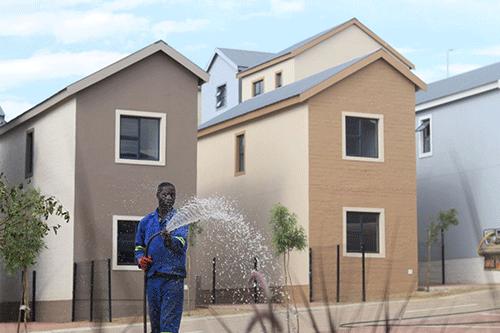The massive Ongos Valley housing development on the northern outskirts of Windhoek has reaffirmed its intention to generate some of its own electricity using renewable solar energy. This is despite strong objections and a legal challenge by the City of Windhoek that remains adamant that Ongos should buy all its electricity from the City.
Ongos Valley Development (OVD) project spokesperson, Abed Erastus, last week said the Ongos solar project would be developed employing the concept of a virtual power plant (VPP) that utilises a combination of rooftop and solar farm panels at strategic locations at Ongos Valley.
A VPP is a network of decentralised generation or storage units. This could range from wind farms to rooftop solar and battery storage.
The N$25 billion housing project is a 20-year mixed use development being erected just 14 kilometres from Windhoek’s central business district. The area covers 1 743 hectares, with 28 000 dwellings to be constructed that will include schools, numerous malls and service stations, as well as institutions and businesses.
“Our only intention is generating a portion of our electricity needs using the abundant sunshine that our nation has been blessed with. The City of Windhoek remains a key stakeholder in our development and will continue to do so indefinitely. We aim to become one of the first green city developments in Southern Africa,” said Erastus.
On the other hand, the City is fighting in court for a review of the solar power project approval Ongos received from energy minister Tom Alweendo. The minister allegedly granted OVD permission to operate within the City’s electricity distribution and supply licences.
According to court documents, Alweendo wrote a letter to the City, requesting it to indicate its preferred option, where the minister offered two options. This includes allowing OVD to distribute electricity under its licences or alternatively the City should agree to compensate OVD for its electricity infrastructure development costs.
Second respondent of the legal challenge, the Electricity Control Board (ECB), last year communicated that OVD received approval from the energy ministry to operate its solar power plant within the city.
“The permission has been granted for 15 years as from 1 September 2022, or until such a time OVD have recouped their investment, whichever comes first,” the documents read.
Ongos respondents have in the meantime noted their intention to oppose the City’s legal challenge with the matter expected back in court on 6 November 2023.
Furthermore, Erastus shared that Ongos expects their first residents to move in within the next six to eight weeks. “We have constructed just over 450 units currently. During our peak construction period, we had just over 2000 workers on site,” Erastus stated.
It is estimated that Namibia will have to construct more than 30 000 houses annually over the next 10 years to clear the escalating housing backlog of approximately 300 000 houses.
Last year, the World Bank recommended that Namibia needs to support the finalisation and implementation of a housing strategy, drawing upon global experience, to promote sustainable urban development in order to fight the massive backlog.
“Leverage lessons from the student village and Windhoek housing projects to refine the housing public private partnership framework, while also implementing digitalisation measures to improve cost and efficiency of the entire land delivery process, including land design, titling, approval, and registration,” the bank recommended.
In its medium to long-term recommendations, the World Bank report stated Namibia should create regulatory frameworks for the issuance of green housing finance. Also, the global financial institution suggested the introduction of innovative market-appropriate financial products for low and middle-income housing segments.



